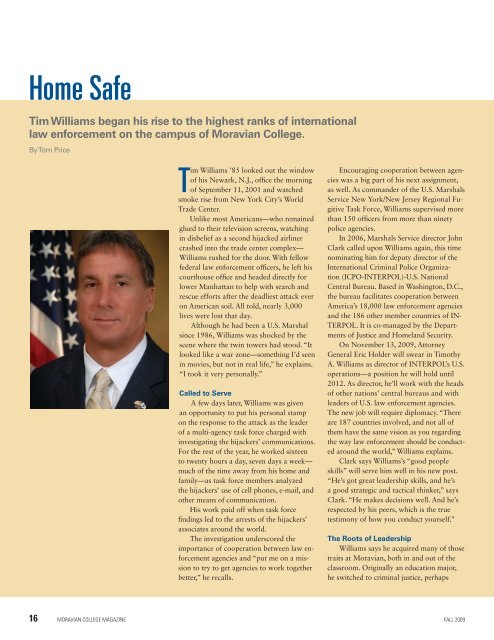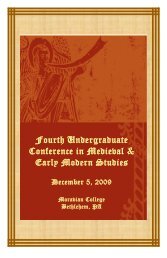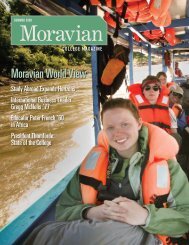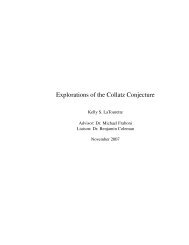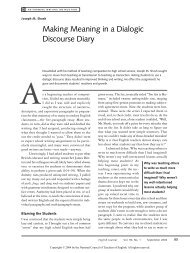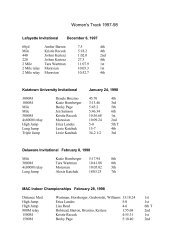Cultivating Leadership - Moravian College
Cultivating Leadership - Moravian College
Cultivating Leadership - Moravian College
- No tags were found...
Create successful ePaper yourself
Turn your PDF publications into a flip-book with our unique Google optimized e-Paper software.
Home SafeTim Williams began his rise to the highest ranks of internationallaw enforcement on the campus of <strong>Moravian</strong> <strong>College</strong>.By Tom PriceTim Williams ’85 looked out the windowof his Newark, N.J., office the morningof September 11, 2001 and watchedsmoke rise from New York City’s WorldTrade Center.Unlike most Americans—who remainedglued to their television screens, watchingin disbelief as a second hijacked airlinercrashed into the trade center complex—Williams rushed for the door. With fellowfederal law enforcement officers, he left hiscourthouse office and headed directly forlower Manhattan to help with search andrescue efforts after the deadliest attack everon American soil. All told, nearly 3,000lives were lost that day.Although he had been a U.S. Marshalsince 1986, Williams was shocked by thescene where the twin towers had stood. “Itlooked like a war zone—something I’d seenin movies, but not in real life,” he explains.“I took it very personally.”Called to ServeA few days later, Williams was givenan opportunity to put his personal stampon the response to the attack as the leaderof a multi-agency task force charged withinvestigating the hijackers’ communications.For the rest of the year, he worked sixteento twenty hours a day, seven days a week—much of the time away from his home andfamily—as task force members analyzedthe hijackers’ use of cell phones, e-mail, andother means of communication.His work paid off when task forcefindings led to the arrests of the hijackers’associates around the world.The investigation underscored theimportance of cooperation between law enforcementagencies and “put me on a missionto try to get agencies to work togetherbetter,” he recalls.Encouraging cooperation between agencieswas a big part of his next assignment,as well. As commander of the U.S. MarshalsService New York/New Jersey Regional FugitiveTask Force, Williams supervised morethan 150 officers from more than ninetypolice agencies.In 2006, Marshals Service director JohnClark called upon Williams again, this timenominating him for deputy director of theInternational Criminal Police Organization(ICPO-INTERPOL)-U.S. NationalCentral Bureau. Based in Washington, D.C.,the bureau facilitates cooperation betweenAmerica’s 18,000 law enforcement agenciesand the 186 other member countries of IN-TERPOL. It is co-managed by the Departmentsof Justice and Homeland Security.On November 13, 2009, AttorneyGeneral Eric Holder will swear in TimothyA. Williams as director of INTERPOL’s U.S.operations—a position he will hold until2012. As director, he’ll work with the headsof other nations’ central bureaus and withleaders of U.S. law enforcement agencies.The new job will require diplomacy. “Thereare 187 countries involved, and not all ofthem have the same vision as you regardingthe way law enforcement should be conductedaround the world,” Williams explains.Clark says Williams’s “good peopleskills” will serve him well in his new post.“He’s got great leadership skills, and he’sa good strategic and tactical thinker,” saysClark. “He makes decisions well. And he’srespected by his peers, which is the truetestimony of how you conduct yourself.”The Roots of <strong>Leadership</strong>Williams says he acquired many of thosetraits at <strong>Moravian</strong>, both in and out of theclassroom. Originally an education major,he switched to criminal justice, perhaps16 MORAVIAN COLLEGE MAGAZINE FALL 2009


